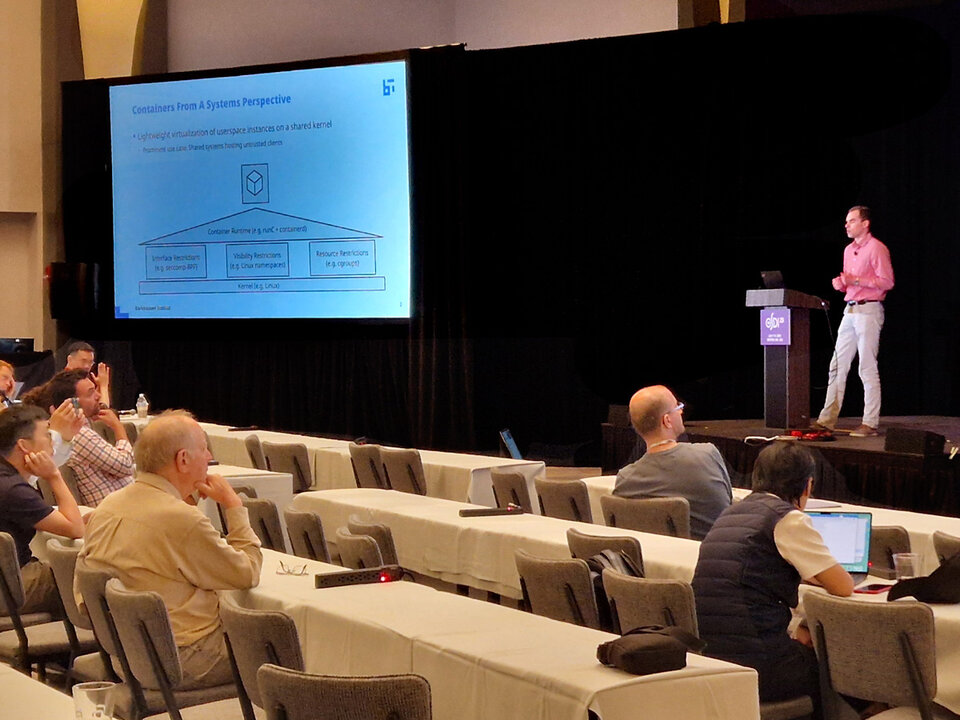FOSSIL – Small Microkernels, Big Performance
An interview on the outcomes and insights of project FOSSIL
The FOSSIL project has come to an end. Over several years, researchers at the Barkhausen Institut have explored how microkernel-based operating systems can be developed for modern computer systems.
In this closing interview, BI researcher Till Miemietz from the Composable Operating Systems research group discusses the project’s key findings, their significance for digital infrastructures, and the impact on his own research.

What were the main scientific objectives of the project?
At the beginning, the FOSSIL project primarily focused on integrating new memory technologies, such as non-volatile main memory, into a microkernel-based operating system. Over the course of the project, however, the focus shifted toward improving the performance and scalability of microkernel-based operating systems on server systems.
What results and findings emerged from the project?
We were able to demonstrate that microkernel-based operating systems – contrary to widespread prejudice – are indeed suitable for use on large-scale systems. Within FOSSIL, for example, we showed how a microkernel-based OS such as L4Re can be used to implement containers. In cloud environments, containers are a widely used mechanism for protecting applications and their data.
On the one hand, this made use of L4Re’s inherent security properties. On the other, throughout FOSSIL we introduced numerous modifications to L4Re that improved its performance on large computing systems. Performance benchmarks show that the modified version of L4Re can, in relevant application scenarios, reach performance levels comparable to standard solutions like Linux, while at the same time offering significantly stronger security properties.
What will happen with the research results?
The results are made publicly available. Modifications to the core components of L4Re are, in coordination with the maintainers, fed directly into the respective projects and thus finding their way into industrial use cases.
Can the scientific community access them as open source?
Yes, the results are made available on public Git platforms such as GitHub.
How do citizens, companies, or other institutions benefit from the results?
Operating systems like L4Re form the foundation of trustworthy digital infrastructure. In a digitalized world, control over operating systems ultimately also means control over critical systems such as energy supply, water supply, or telecommunications infrastructure.
Unfortunately, today’s commonly used operating systems are often vulnerable to attacks by design. In addition, both the systems themselves and their development processes are frequently under the control of foreign actors, which makes their use in security-critical applications questionable.
With its microkernel architecture, L4Re provides significantly improved protection against attacks and is a genuine “Made in Germany” operating system, developed under German control. With our research at the Barkhausen Institut, we are paving the way for microkernel OS to be used in an increasing number of application areas. In the long run, this strengthens the resilience of domestic infrastructure.

What does the project mean for you and your research in particular?
From my perspective, the project allowed us to make a substantial contribution to Germany’s digital sovereignty. Beyond that, we were also able to convince an international audience with our ideas, and we do not have to shy away from comparisons with competing systems. I am particularly pleased that the results of FOSSIL have managed to make the leap into industrial application.
Last but not least, my own scientific work was only made possible through this funding. For that reason, the project is also of great importance to my personal career.
Even though the FOSSIL project has concluded, its results remain highly relevant – providing valuable impulses for future research and for advancing trustworthy digital systems.
